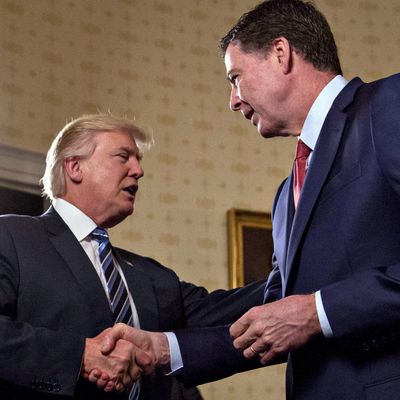
Rudy Giuliani tells Axios that his client, President Trump, is currently willing to speak to Special Counsel Robert Mueller on the condition that he not be asked about two subjects: why Trump fired FBI director James Comey, and what Trump said to Comey about the investigation of former national security adviser Michael Flynn.
You might wonder if the specificity of this demand sounds just a wee bit suspicious, as if Trump’s lawyers are pointing frantically at a locked door at a crime scene and shouting “Don’t go in there!” You would be right.
On June 23, 1972, six days after the Watergate burglary, President Richard Nixon ordered that the FBI be told, “Don’t go any further into this case period!” Nixon’s comment, uttered in confidentiality, was not publicly disclosed for more than two years. When his order finally came to light, in August 1974, it struck a death blow to Nixon’s standing, forcing him to resign within a few days. Nixon later admitted his order was an “inexcusable error.”
The Russia scandal has followed an eerily similar fact pattern to Watergate. Both cases feature as the central underlying crime the burglary of private files from the Democratic National Committee in order to give Republicans an advantage in a presidential campaign. Both cases also feature the president leaning on the FBI to quash an investigation that might connect the burglary to the president and his inner circle.
The primary difference is the chronology. Nixon’s attempt to obstruct justice came as the crowning revelation of a long unfolding scandal. Trump’s similar attempt came right at the beginning. In every other way, it was worse. Nixon filtered his order to the FBI through the CIA. Trump did it directly, asking FBI director James Comey to go easy on Michael Flynn. And Trump, unlike Nixon, fired his FBI director for failing to take him up on it.
The inverted chronology of Trump’s obstruction of justice has had the curious effect of muting its import. We are accustomed — not only by Watergate but by every criminal or detective drama — to expect evidence to mount to a crescendo over time. Nobody knows quite how to respond to the spectacle of a president committing high crimes and misdemeanors in his first few weeks in office, and then simply confessing to them casually in a subsequent television interview.
So here we are, with a giant piece of incriminating evidence sitting out in plain sight for well over a year. The explanation from the Trump legal team for why the special counsel cannot ask the president about it implicitly takes his guilt as a given. It would be a “perjury trap,” they have insisted.
A perjury trap is a real thing. The term describes when prosecutors lure a witness into giving false testimony, usually for reasons other than covering up a crime, knowing they can prove the claim was false, and then nail them for perjury. The impeachment of President Clinton was a classic perjury trap. Special Prosecutor Ken Starr asked the president about an affair with Monica Lewinsky, knowing Clinton — like most people who have affairs, especially politicians — would lie about it.
Asking Trump about his attempt to manipulate his FBI director is not a perjury trap. The question is not extraneous to a crime, it is a crime. He was very consciously attempting to stop an investigation into his administration. The mere fact that his lawyers are discussing it well in advance indicates that the subject matter is not a perjury trap, because the “trap” aspect involves the witness not knowing beforehand that the question is designed to produce a lie.
Trump’s lawyers have presumably concluded that they have no defense of his obstruction of justice. Faced with a choice between admitting to obstruction of justice, or denying it and risking perjury, Trump’s choice is to avoid the question altogether.





























